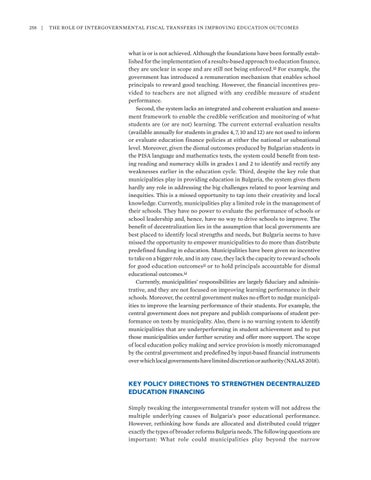258 | The Role of Intergovernmental Fiscal Transfers in Improving Education Outcomes
what is or is not achieved. Although the foundations have been formally established for the implementation of a results-based approach to education finance, they are unclear in scope and are still not being enforced.10 For example, the government has introduced a remuneration mechanism that enables school principals to reward good teaching. However, the financial incentives provided to teachers are not aligned with any credible measure of student performance. Second, the system lacks an integrated and coherent evaluation and assessment framework to enable the credible verification and monitoring of what students are (or are not) learning. The current external evaluation results (available annually for students in grades 4, 7, 10 and 12) are not used to inform or evaluate education finance policies at either the national or subnational level. Moreover, given the dismal outcomes produced by Bulgarian students in the PISA language and mathematics tests, the system could benefit from testing reading and numeracy skills in grades 1 and 2 to identify and rectify any weaknesses earlier in the education cycle. Third, despite the key role that municipalities play in providing education in Bulgaria, the system gives them hardly any role in addressing the big challenges related to poor learning and inequities. This is a missed opportunity to tap into their creativity and local knowledge. Currently, municipalities play a limited role in the management of their schools. They have no power to evaluate the performance of schools or school leadership and, hence, have no way to drive schools to improve. The benefit of decentralization lies in the assumption that local governments are best placed to identify local strengths and needs, but Bulgaria seems to have missed the opportunity to empower municipalities to do more than distribute predefined funding in education. Municipalities have been given no incentive to take on a bigger role, and in any case, they lack the capacity to reward schools for good education outcomes11 or to hold principals accountable for dismal educational outcomes.12 Currently, municipalities’ responsibilities are largely fiduciary and administrative, and they are not focused on improving learning performance in their schools. Moreover, the central government makes no effort to nudge municipalities to improve the learning performance of their students. For example, the central government does not prepare and publish comparisons of student performance on tests by municipality. Also, there is no warning system to identify municipalities that are underperforming in student achievement and to put those municipalities under further scrutiny and offer more support. The scope of local education policy making and service provision is mostly micromanaged by the central government and predefined by input-based financial instruments over which local governments have limited discretion or authority (NALAS 2018).
KEY POLICY DIRECTIONS TO STRENGTHEN DECENTRALIZED EDUCATION FINANCING Simply tweaking the intergovernmental transfer system will not address the multiple underlying causes of Bulgaria’s poor educational performance. However, rethinking how funds are allocated and distributed could trigger exactly the types of broader reforms Bulgaria needs. The following questions are important: What role could municipalities play beyond the narrow






